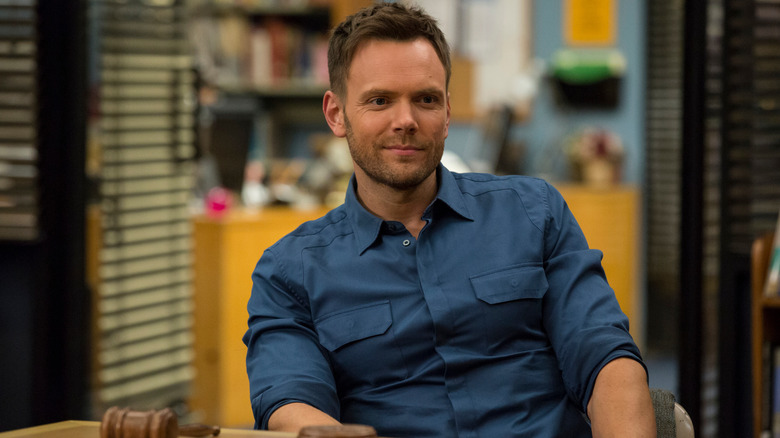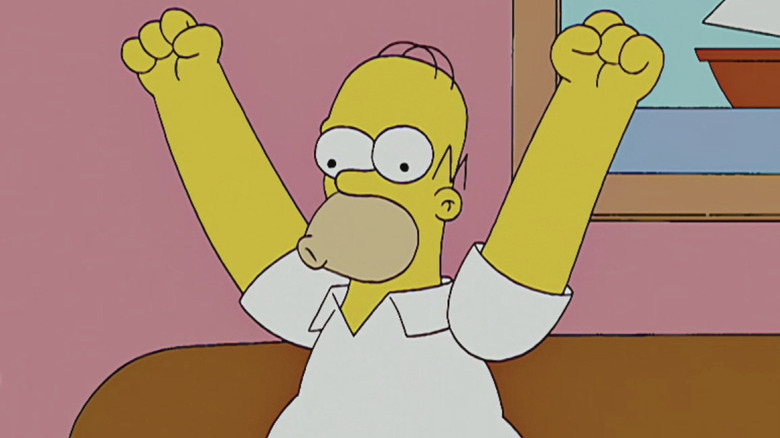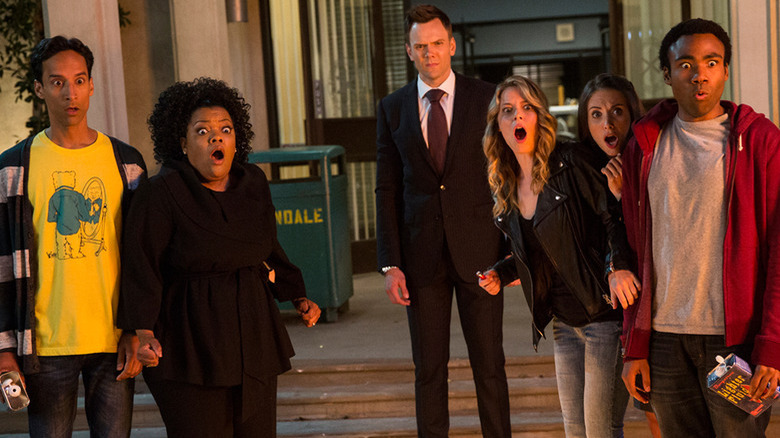A Similarity To The Simpsons Sold Joel McHale On Community's Pilot Script
Dan Harmon's "Community" remains one of the best sitcoms of the 2010s, a network comedy that, for six seasons (and hopefully a movie), broke the mold time and time again. With a foot firmly set in pop culture obsession, it often still found the time to comment on life in America and interpersonal relationships.
"Community" is also a show that had well-rounded and defined characters that resembled sitcom archetypes but hid so much more underneath the surface, at least at first. Sadly, these characters became more and more like one-dimensional caricatures as the show went on. Whether that is Britta becoming "The AT&T of people" or Pierce going from the group's grumpy, racist, but well-meaning dad to just the absolute worst person ever, almost every character got progressively worse as time went on.
This is something the show has in common with "The Simpsons," but at one point the comparisons between the two shows were actually more favorable. Just ask "Community" star Joel McHale.
Jokes on jokes on jokes
Long before the show became known for its high concept episodes that parody sci-fi, western, conspiracy thrillers, war docs and more, "Community" was simply a really funny series about the community college experience. Sure, the show was frantic and frenetic, but it was also very funny.
Speaking to The Independent, Joel McHale, who played protagonist Jeff Winger, said the pilot episode was very funny. "The structure and the way the characters were introduced were so well painted — that alone lets you know the person writing it knows what they're doing," McHale said. "The joke rate per page was similar to 'The Simpsons.'"
Indeed, both shows pull off great pilot episodes with rapid-fire jokes being thrown at the audience. The characters have clearly-defined personalities that allow for a very funny clash of ideas. Whether it's Danny Pudi's Abed and Pierce just not being able to communicate, or Troy and Annie's awkward first encounter post-high school, the first episode alone is enough to convince you that the show will push boundaries and also be incredibly funny.
The Flanderization of Community
When we first meet Jeff Winger, he is not a likable protagonist. He is a character straight out of a legal drama where he'd normally be the villain, a jerk who cares about nothing and no one other than himself and only forms a study group to sleep with one of the other students. As McHale told The Independent:
"I knew I could play an A-hole because I leaned into that on 'The Soup' [the satirical talk show McHale hosted between 2004-2015] — it didn't mean I was an ***hole — just more than happy to speak my mind in every situation. I thought that part of Jeff was similar to me."
But as the show went along, Jeff grew a heart and learned to embrace the community he formed at Greendale Community College, something that was still present in the first episode, as we see that Jeff isn't entirely heartless. This stands in contrast with other characters on the show, who began fleshed out and layered but ended up becoming caricatures. This happened most prominently with Britta, once the best character in "Community," the voice of reason and the most mature person in the study group. Yet, as the show went along, the show placed all of Britta's early likability onto Annie, leaving Britta as the sour and angry former love interest of Jeff, and turning her into a complete airhead whose leftist politics became the butt of the joke. Unfortunately, this is exactly what happened to "The Simpsons."
Stupid caricature Flanders
On "The Simpsons," Homer started out as a loving, if short-tempered father who did the best he could for his children. Yet as the seasons went along, he became dumber and angrier, incapable of a single intelligent thought, prone to outburst of rage at any moment, and easily compared to a baboon. In fact, in one episode, Homer is literally used as evidence that man evolved from monkeys.
Likewise, where Ned Flanders started out as a parody of your typical church-going American neighbor, he became a caricature, obsessed with the church until there was no personality to him other than mannerisms. This is because, as more and more seasons of the show were produced, there were fewer and fewer stories to tell with the characters, and fewer places to take them. There is only so much character development you can give a character over the course of three decades, especially one that becomes popular due to a few key traits.
"The Simpsons" was never able to bring back the fleshed out characterization of its early seasons, but if the "Community" movie ends up happening, let us hope they learn from that first season and its comparison to the greatest animated sitcom of all time.



